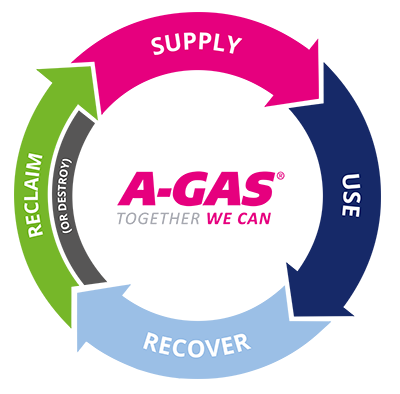15 August 2024
|
As global temperatures rise, the role of refrigerants is becoming more important in daily society, says industry specialist A-Gas.
Both cooling and heating applications will become essential in keeping the planet hospitable for communities worldwide in the years to come, meaning that the RACHP industry has a vital role to play in creating a viable future.
Historically, many of the refrigerants installed in applications like air conditioning units were Ozone Depleting Substances (ODS), posing a significant risk if they were released into the atmosphere. The Montreal Protocol (MOP), signed in 1987, aimed to phase out these gases. They were replaced by (among other things) hydrofluorocarbons (HFCs), but while these are not ozone-depleting, they still have a high Global Warming Potential (GWP). The Kigali Amendment, signed in 2016, addressed this further, asking governments and institutions to commit to an 80% reduction in the production and consumption of HFCs over the next three decades.
Other initiatives, such as the recent EU F-Gas Regulation, will speed up the phasedown. However, they do not provide a fulsome solution for the refrigerants already in use. Without a responsible lifecycle management programme, the risk of the gases being released into the atmosphere grows. Transitioning towards the circular economy is an important step in minimising that risk.
The circular economy is an antidote to the ‘Take, Make, Dispose’ model that has dominated our industry for decades, and the recovery and reclamation of used refrigerants are central to it. Reclaiming refrigerants to industry-accepted AHRI 700 standards and re-supplying them back to the market extends their lifetime and mitigates their potential impact on the environment. Simply put, the more refrigerant that is recovered, reclaimed and repurposed, the bigger the chance we have of reducing the cooling industry’s Greenhouse Gas (GHG) emissions in line with net-zero targets.
Embracing these principles is not straightforward, however. Many national authorities currently lack the resources to properly enforce laws around refrigerants (something emphasised by the ongoing illegal trade of refrigerants). There are also some technical challenges; returned refrigerant waste is often too mixed to be effectively reclaimed, and the rules on reusing recovered refrigerants are not always clear.
The solution to these problems is an effective and wide-ranging Lifecycle Refrigerant Management (LRM) programme, and this is where A-Gas shines.
Circular economy
When the company started in 1993, it was a humble gas distribution company. Today, it is a market-leading LRM business that helps its customers embrace circular economy principles. Through services like its Rapid Recovery offering, A-Gas recovers legacy refrigerant gas in a way that is responsible, flexible, on-site and up to 10 times faster than traditional methods. Because reclaimed refrigerant functions just as well as virgin products, it provides its customers with a high-quality solution while mitigating emissions.
Increasing the circularity of refrigerants and limiting the need for virgin production supports customers with their own environmental goals.
While both reclaiming and recycling used refrigerant are good practice, they are not exactly the same thing and, as such, do not offer the same benefits. This is particularly true in the case of product quality; a recycled refrigerant will never meet the same level of purity as a reclaimed refrigerant.
Recovery and reclamation are more important now than ever and are at the core of A-Gas’ business strategy. By ensuring that as much reclaimed refrigerant as possible is repurposed back into the market, customers are given greater choice and are consistently supported in adapting to any new rules and regulations. The more the industry adopts circular economy principles, the more it can contribute to enabling a viable future for the planet.

At A-Gas, our Lifecycle Refrigerant Management initiatives help our customers to achieve their sustainability and emissions goals. LRM aims to ensure that: “No kilogram or pound of refrigerant, once produced, is released into the atmosphere.”








